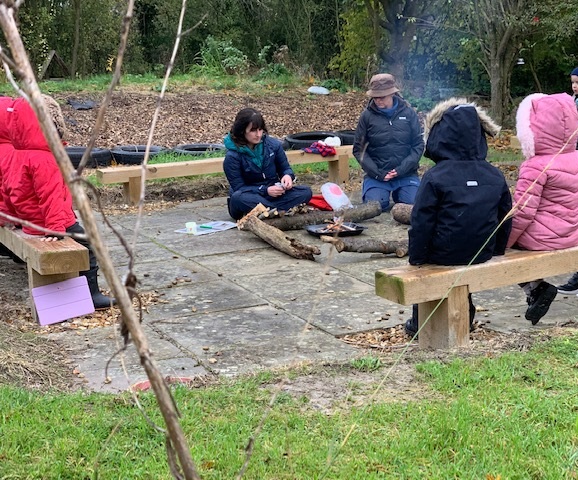Forest Schools and The Woodland Garden
Forest Schools
During the year 21/22 8 members of staff are training as Forest School Leaders and Assistants. This approach to learning compliments our Early Years Curriculum and the Hygge approach to learning. We want children to be able to experience outside learning and challenges across the school and this approach is perfect for our children.
Children now take part in a variety of Forest Schools activities in their day to day learning building on their mathematical, scientific, DT, teamwork, and listening skills. They are taught how to deal with risk when approaching Forest School activities. The children love it and so do we. With all high level activities there is an element of risk. Children will be using saws, drills, hammers etc and will be taught to use these properly whilst being supervised. On entry to school we ask all parents to sign a form to say their child can take part in these activities across the year.
The philosophy of Forest Schools is to encourage and inspire individuals of any age through positive outdoor experiences.
It is an inspirational process, that offers ALL learners regular opportunities to achieve and develop confidence and self-esteem through hands-on learning experiences in a woodland or natural environment setting. At Stanbridge we have a beautiful woodland garden area where Forest School sessions can take place.
Whilst taking part in these sessions, children have the opportunity to learn about the natural world, develop practical skills, such as stick carving and fire lighting, and explore and play in their woodland setting. That setting changes with the seasons and the children are out whatever the weather!
Sessions are planned for holistic development using SPICES. Social, Physical, Intellectual, Creativity, Emotional and Spiritual. The practitioner endeavours to offer opportunities to develop as many of these as possible.
S: social. Learners develop social skills enabling good communication, to be able to resolve conflicts, be empathetic and respectful. To be able to challenge the social norms in a respectful manner understanding great British values. Develop skills in communicating needs. Recognise and develop positive relationships.
P: physical Learners have opportunities to develop motor skills both fine and gross. Physical exercise for health and wellbeing and opportunities to “let off steam” through physical exertion and Play.
I: intellectual. Learners will expand vocabulary and use in conversation. Ask questions, wonder “why” and challenge themselves to find out. Learners might begin to apply learning from and to core subject material. Learners are able to acknowledge their impact on others and on the environment. Learners can identify some species of Flora and Fauna. Are able to recognise some in different seasons and begin to use long term memory for this.
C: creativity. Learners develop “outside the box” thinking. Think of solutions to problems. Learners become able to use natural materials for creativity. Learners use imagination though creative crafts, games, story telling etc.
E: emotional. Learners develop awareness and build skills in self-esteem, resilience, and empathy. Learners develop ability to communicate feelings and to recognise and respect others feelings.
S: spiritual. Learners find their own ways to connect with nature. Learners develop a community ethos, and the reflection time becomes and important time during Forest School sessions. Learners exposed to spiritual ideas through storytelling, sharing thoughts on the seasons, connection to wildlife and seasonal holidays/celebrations.
Play. Play is a vital part of the Forest School process and an important part of how learning happens. Any and all opportunities to play are made. Play will take priority over a planned activity if the learner(s) instigate it.

The Woodland Garden
The Woodland Garden was renovated by the PTFA during the school closure period due to COVID 19. They completely transformed the garden. The garden was originally designed in the year 2000 to celebrate the millennium year. It is now used to support the curriculum across the year and Forest School activities. It has a pond, seasonal plants and lots of mini beasts live there.






